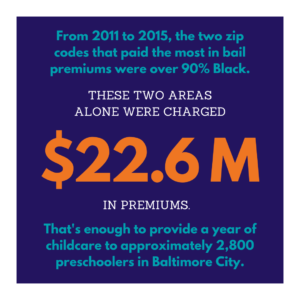In many states, including Maryland, the use of cash bail creates a two-tier system of justice based on income. Individuals who can afford to post bail are able to buy their freedom, and individuals who cannot are detained for days, weeks, months, and even years at a time. Every day spent in detention increases the severity of consequences the poor must face, as the likelihood of receiving a criminal conviction increases in proportion to time spent in jail. Pretrial detention is disruptive to an individual’s life and can result in loss of employment, public assistance, housing and other needs. Thus, the current system of cash bail in Maryland leads to the criminalization and further impoverishment of the poor.
Indeed, it is well established that Black and Brown people are arrested at higher rates due to racial profiling, and are disproportionately affected by the cash bail system. Estimates show that the rate of Black defendants in 2012 was nearly five times higher than Whites, and three times higher than Hispanics. Despite landmark changes to state pretrial rules in 2017, those numbers haven’t changed much.
Currently in Maryland, when an individual is arrested and taken into custody, they must appear before a District Court Commissioner for an initial hearing within 24 hours after arrest. If the individual is not released on their own recognizance (with a written promise to return to court on a specified date) or with a bond, they are sent to a District Court judge for a bail review hearing, which occurs the next court business day.
At either the initial hearing or the bail hearing, if an individual is not released on their own recognizance, the courts may offer three (3) general types of financial bonds:
• An unsecured bond, where the defendant simply signs a document to personally guarantee they will appear, and if they do not, they will pay the full bond amount.
• A 10% cash deposit on the bond.
• A cash bond, where the defendant has the option to either pay the full bond amount in order to be released, with the bond returned at the end of the case provided that it is not forfeited for the individual’s failure to appear in court; or to engage the services of a commercial, for-profit bail bonding company that guarantees, before the defendant’s release, the full bond amount.
If the defendant satisfies the cash bond and appears for court, their monies are reimbursed at the conclusion of the trial, regardless of the verdict. However, bail bondsmen typically require defendants to pay a nonrefundable fee of 10% of the bond amount, either as a lump sum or in installments. None of those monies are returned, even if the individual appears for court. If an individual is unable to afford any of these options at the time of the hearing, they must stay in jail either until they raise enough money to afford one of the above options, or until the case against them is settled by either a plea or trial. In effect, the individual is criminalized due to their poverty.
Pretrial detention is intended only for individuals who pose a threat to public safety, or may be a flight risk and therefore may not show up at court. Research has shown that pretrial detention increases the likelihood of being arrested upon release. New Jersey and Washington, D.C. have eliminated the use of cash bail, and studies have shown that defendants appear in court at the same or higher rates than before reforms were implemented. However, the practice of detaining individuals pretrial has become commonplace, despite recent court rule changes. In Maryland, a bail schedule is not used. Non-judicial court commissioners make bail decisions based on a number of different factors as required by legislative statute, including the nature and circumstance of the offense, an individual’s prior record, community ties, any recommendation from the State’s Attorney’s Office, if provided, and other factors.

In May 2020, through an anonymous donation, the Job Opportunities Task Force (JOTF) established its first community bail fund – the Community Bail Fund for Baltimore City. This Fund supports city residents represented by the Maryland Office of the Public Defender who are charged with nonviolent offenses. This Fund prioritizes individuals who identify as women and individuals under the age of 25. The following month, JOTF began soliciting funds to support individuals incarcerated in pretrial detention due to an unaffordable cash bail. These funds will prioritize pretrial defendants, regardless of gender or age, in Baltimore County, Montgomery and Prince George’s County. In addition to facilitating the payment of cash bails, JOTF provides customized, intensive case management support to the individuals released. This includes transportation supports, court preparation, connection with critical services and resources, and more.
The cash bail system does nothing to promote long-term public safety and perpetuates the criminalization of poverty and race. As JOTF continues to advocate for the elimination of cash bail in pretrial decisions, and other policies that disproportionately incarcerate low-income individuals of color, JOTF’s Community Bail Fund serves to immediately reduce harm, particularly given the impacts of the coronavirus. We hope you will join us.

